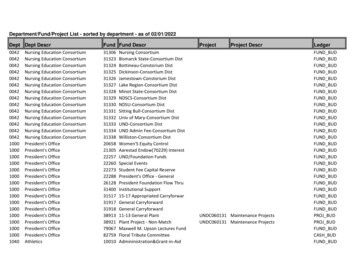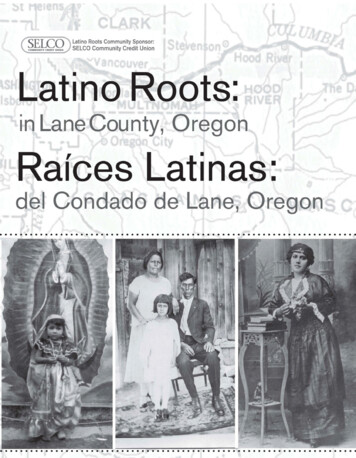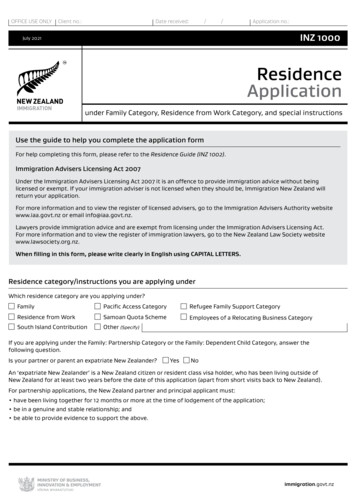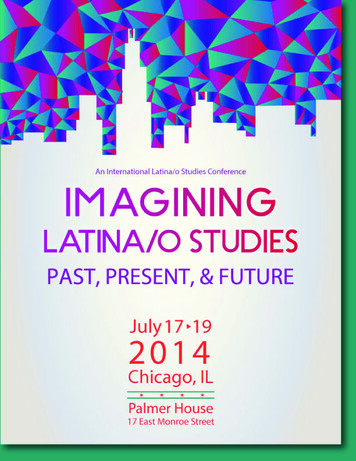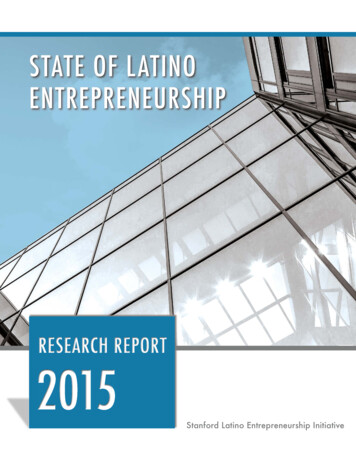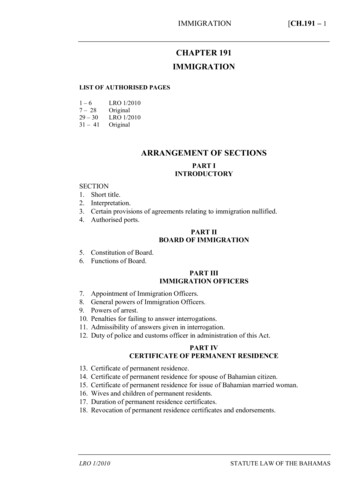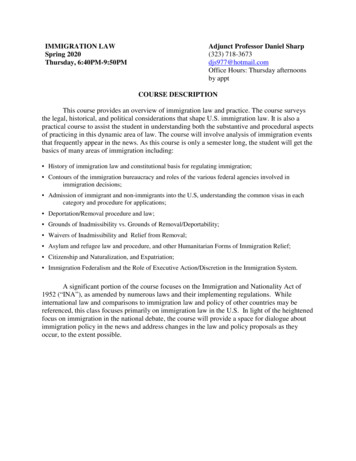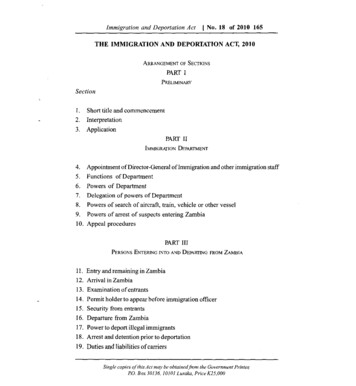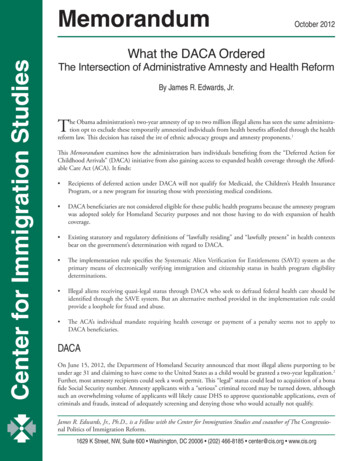
Transcription
Consortium for Latino Immigration StudiesLatino Studies NoticiasConsortium for Latino Immigration StudiesWalker Institute of International and Area Studies440 Gambrell Hall,University of South Carolina, Columbia, SC 29208Office: 803-777-1243Fax: 803-777-9308clis@gwm.sc.eduInside this issue:2Bi-NationalConnections2Consortium Events3Hispanic LiteracySummit4Maymester in Mexico!4Faculty Focus5Join the Consortium6the years 2000 and 2003the total population growthof South Carolina was 3.3%.For the same three years, thegrowth of the Latino population in South Carolina was:A) 8% B) 10% C) 16%See page 5. 2005University ofSouth Carolinawww.cas.sc.edu/cliFrom the DirectorHispanic StudentOrganizationDo you know? BetweenMarch 2005Volume 1, Issue 1Welcome to the first edition of this newsletter, produced by the Consortium for LatinoImmigration Studies, a new research entity based at the University of South Carolina.With over forty affiliates from among faculty and graduate students at USC, ClemsonUniversity, other colleges and universities in South Carolina, as well as the University ofVeracruz, Mexico, the Consortium promotes and coordinates interdisciplinary and transnational research on the experiences of Latino/as in South Carolina and the Southeast.In this and subsequent editions of the Consortium’s newsletter we will share informationabout our activities, our affiliates, research findings, and news from the Latino community.First, some background on the Consortium’s origin: the Consortium grew out of theLatino Immigration Project, which, in response to requests from local and state policymakers, was initiated in fall 2003 to gather information on South Carolina’s growing Latino population. (According to U.S. Census data, the state’s Hispanic/Latino populationgrew by 258 percent between 1990 and 2002, while in the same period their numbersincreased in the nation as a whole by 59 percent). The Latino Immigration Project washoused within the Latin American Studies Program at USC. In fall 2003 and spring 2004Project leaders Dr. Michael Scardaville, former Director of the Latin American StudiesProgram, and Dr. Elaine Lacy, Professor of History at USC Aiken, with the support ofthe former College of Liberal Arts (now the College of Arts and Sciences), initiated collaborative efforts with entities in one of the major sending regions of Latinos to SouthCarolina: Veracruz, Mexico.Out of this collaboration withresearchers at the Universityof Veracruz and the Consejode Desarrollo de Papaloapan,an agency within the Veracruzstate government, came formalMemoranda of Agreement withUSC, and a bi-national conference on migration betweenVeracruz and South Carolina,held in March 2004. Over fiftySouth Carolinians traveled toVeracruz to participate in theconference, including researchers and graduate students from USC, Clemson andother institutions of higher ed-See “From the Director”, p5Community meeting at Coyopolan Veracruz with USCstudents and faculty, March 2004
Page 2Latino Studies NoticiasHispanic Student Organization Joins Campus CommunityThe National Society of Hispanic Professional Engineers (SHPE) was foundedin 1974 by a group of engineers in Los Angeles. Their objective was to form a nationalorganization of professional engineers to serve as role models in the Hispanic community. Today, SHPE enjoys a strong but independent network of professional and studentchapters throughout the nation.The SHPE South Carolina Gamecocks Chapter of the SHPE was founded in2004, when some USC Hispanic students who wanted interaction with others of similarcultural backgrounds and experiences issued a call for membership. They were overSC Gamecocks Chapter ofwhelmed with the response. The new organization now includes 20 members from difSociety of Hispanic Professional ferent Latin American nations, including Puerto Rico, Mexico, Argentina, the DominicanEngineers.Republic, Colombia, and Venezuela. Membership is not restricted to Engineering majors, and several members come from other disciplines. Among SHPE’s objectives is toserve the local Hispanic community, especially students. They also hope to increasethe number of Hispanic engineering students at USC, promote the education, retentionand employment of Hispanic engineers and scientists, and develop and participate inTo learn more about thecollaborative programs with the university and local industry.SC Chapter of the SocietyWithin 6 months, the local SHPE chapter was participating in community serof Hispanic Professionalvices activities, including a Christmas toy drive for Hispanic families. Members alsoEngineers and their futureplanted a Carolina Fence Garden in Rosewood Park as part of the Martin Luther KingDay of Service. Members are eager to see an increase in the size of USC’s Hispanicactivities, contactcommunity and to play a more active role in service for the university and the largershpeusc@gwm.sc.educommunity. If you would like more information about the chapter and future activities,please contact shpeusc@gwm.sc.edu.Bi-National ConnectionsBaja California NorteSonoraChihuahuaCoahuilaBaja California SurNuevo LeonDurangoTamaulipasZacatecasSinaloaNayaritSan Luis lgoYucatanDistritoMexicoFederal TlaxcalaMichoacanColimaMorelos PueblaQuintana RooVeracruzTabascoGuerreroOaxacaChiapasThe State of Veracruz,Mexico (shaded)CampecheLast summer a group of scholars from USC and Clemson journeyed to the Gulf Coaststate of Veracruz in Mexico. They found South Carolina license plates on cars andtrucks in various communities scattered across the highlands, tangible evidence of thestrong connections that have evolved between these two states. In the past five years,the state of Veracruz has become is the primary point of origin of Mexicans living inSouth Carolina, and in July 2004 the Consortium for Latino Immigration Studies sponsored a research trip to Veracruz to better understand the factors behind this connection.As part of their 10-day research expedition, USC's Dr. Elaine Lacy, Dr. ThomasLeatherman (Anthropology), Dr. Myriam Torres (SC Rural Health Research Center), Dr.Michael Scardaville (History), Lariza Miranda-Chalfant (Nursing), and Clemson's BrendaVander Mey (Sociology) met with migrationscholars and other colleagues at the Universityof Veracruz. They developed a preliminary binational migration research agenda, and theyalso visited diverse communities in the Córdoba-Orizaba and Tlacotalpan regions to interview residents who have either lived or havefamily members in "las Carolinas." The tripconcluded with the signing of a Memorandumof Agreement between the University of Veracruz and the University of South Carolina toformalize the budding relationship betweenfaculty and students at both institutions.Children in Veracruz pose on a truckfrom South Carolina
Volume 1, Issue 1Page 3Our MissionThe Consortium for Latino Immigration Studies promotes and coordinates interdisciplinary and transnational research on the experiences of Latino/as in South Carolina and the Southeast. The Consortium also disseminates research findings and other information on Hispanic/Latino issues to academic and non-academic users through such venues as conferences, symposia, workshops andpublications, and fosters application and translation of such findings into practice and policy.Further, the Consortium encourages and supports teaching and service projects related to Latinos, and collaborates with localcommunities as well as organizations and government agencies that are involved with the state's growing Latino population. Throughits various activities the Consortium fulfills the University's mission to improve the quality of life for all state residents.
Page 4Latino Studies NoticiasUpcoming EventsIf you would like information about upcomingConsortium events, pleasejoin the Consortium forLatino Immigration Studies Community Members’Listserv.Find out how to join atwww.cas.sc.edu/cli/On Wednesday, March 23 at 3:30pm, Dr. José Rivera, M.D, a physician in Orangeburg Co. SC will speak on “Migrant Health: A South Carolina Perspective” RussellHouse room 303On Thursday, April 7 at 3:30pm, Rodolfo de la Garza, Ph.D, Vice President of theTomás Rivera Policy Institute will speak on , “The Political Incorporation of Latinos inContemporary America” in the Russell House Theatre. Co-sponsored by The CIBER Center, Latin American Studies Progam, the Department of Political Science and The Institute for Public Service and Policy ResearchOn Friday, April 22 at 3:30pm, Mary Odem, Ph.D, Associate Professor of History atEmory University, will speak on “Global Lives, Local Struggles: Latino Immigrants in theNew South” Russell House room 303.Co-sponsored by the History Department, Women’sStudies and Latin American Studies ProgramLatino Literacy Summit: May 20th 2005The School of Library and Information Science will host the follow-up to last year'sSemillas Hispanic Literacy Summit. This time, the focus is on Libraries, Literacy, andLatinos. Librarians, library administrators, representatives from South Carolina, Georgia,and North Carolina. Hispanic communities and service agencies, and literacy educationprofessionals are invited to attend. Representatives from the Carolina Chapter of Reforma, the national organization dedicated to improving access to libraries by Latinos,will also be present. This summit’s emphasis will be sharing materials and resources tohelp library workers improve access to libraries by Latinos.Please check http://www.libsci.sc.edu/latinos/summit.html for details in the comingweeks.¡Aventura Mexicana!USC and The University ofVeracruz will partner for aMaymester session in 2005.Dr. Wendy Sellers Campbell, College of Social Work, will be leading a group of students and professionals to Veracruz, Mexico as part of Maymester 2005. Participantswill have an opportunity to connect with students and faculty at la Universidad Veracruzana, volunteer with social service agencies, participate in Spanish classes, andlearn about Mexican immigration between Veracruz and South Carolina. Participantswill have the option of staying in Mexico for one or two weeks and will choose betweenstaying with host families or in hotels. Course credit and CEUs will be available for thistrip. No prior Spanish experience is necessary.To learn more about this opportunity, please visit the website at: x.html. Interested participants may also contact Dr.Campbell directly at wendy.campbell@sc.edu or via telephone at (803) 777-8879.If you have an interest inestablishing an affiliationwith the Consortiumplease contact RosemarySharples atsharpler@gwm.sc.edufor an application.Interested in Conducting Quality Research on Latino Issues?If you are a researcher with an interest in issues of migration and/or the Latino communities in South Carolina, we invite you to be included as “Affiliated Faculty” of theConsortium for Latino Immigration Studies at USC.As an Affiliated Faculty Member you could engage in collaborative efforts related toour growing Latino population. You would also be eligible to receive Consortium supportin your research and scholarly activities related to Latino projects.
Volume 1, Issue 1Page 5Faculty FocusWith a joint faculty appointment in the USC Women’s Studies Program and the College of Nursing, consortium affiliate Dr. DeAnne K. Hilfinger Messias probably neverexpected to spend her evenings coordinating the distribution of ESLmaterials to classes around Richland and Lexington counties. That isjust one of the new areas of ‘expertise’ she has acquired as PrincipalInvestigator (PI) of a Hispanic Health Initiatives research grant fromthe Centers for Medicare and Medicaid Services. The two-year research project has involved the conceptualization, development, implementation, and testing of a community-based educational intervention, the Language for Healthcare Access (LHA) curriculum.The LHA curriculum is a series of eight English as a Second Language (ESL) classes which incorporate specific learning objectives,vocabulary development, sentence practice, picture stories, dialogs,and healthcare access skills. The curriculum was developed by theresearch team with the input and consultation of a community advisory board. The aim of the LHA curriculum is to improve the capacityof limited English proficient Spanish speakers to access and navigate the formal U.S. healthcare system.DeAnne K.HilfingerMessias,ConsortiumAffiliateDo You Know Continued from page 1C) the growth of the Latinopopulation in SC between2000-03 was almost 16%In total, of the 136,928new faces in SC duringthose 3 years (by birth andmigration), 18,039(13.2%) were Latinos.Source: www.census.govCommunity-based ESL programs have been recruited into the study and randomizedto intervention and control groups. The intervention sites receive the LHA curriculum,taught by trained ESL teachers. Students enrolled in both control and interventionclasses participate in baseline and follow-up assessment surveys, in Spanish. The researchers expect to show that exposure to the LHA curriculum results in improvedknowledge of the local healthcare system and available healthcare resources, improvedlanguage and communication skills, increased self-efficacy related to access and utilization of healthcare services, and higher levels of satisfaction related to healthcare encounters. A broader goal of the project is to disseminate the LHA curriculum for adaptation and use in other communities and contexts around the United States, once the research is complete.From the Director (cont. from p. 1)state. In June 2004 the Latino Immigration Project hosted a symposium on Latinos inSouth Carolina at USC, and, indicative of the growing interest in our Latino population,more than 150 people from around the state came to share information and learn moreabout our new neighbors.The overwhelming interest generated by the Latino Immigration Project’s activities ledadministrators in the College of Liberal Arts to establish the Consortium for Latino Immigration Studies as a separate entity in July 2004, with Dr. Elaine Lacy as Director. In thefall of 2004 a steering committee made up of 20 Consortium affiliates drew up a missionstatement and strategic plan, and affiliates began developing research projects on issuesrelated to the state and region’s growing Latino residents.Our mission is to promote and coordinate interdisciplinary, transnational research andscholarship on Latinos/as in the state and region, and to disseminate findings to bothacademic and non-academic users in a variety of ways. One of our goals is that thesefindings will shape wise practice and policy. We also aim to encourage and supportteaching and service projects related to Latinos/as, and collaborate with all those involved with the state's growing Latino/a population. In the end, we intend to help fulfillthe University's mission to improve the quality of life for all state residents.To learn more about the Consortium and South Carolina’s Latino population, visit ourwebsite at http://www.cas.sc.edu/cli/.— Elaine LacyAccording to U.S.Census data, the state’sHispanic/Latinopopulation grew by258 percent between1990 and 2002.
Walker Institute of Internationaland Area Studies440 Gambrell HallUniversity of South Carolina,Columbia, SC 29208Visit our website atwww.cas.sc.edu/cli
Immigration Studies, a new research entity based at the University of South Carolina. With over forty affiliates from among faculty and graduate students at USC, Clemson University, other colleges and universities in South Carolina, as well as the University of Veracruz, Mexico, the Consortium promotes and coordinates interdisciplinary and trans-
